 Joe Louis
Joe Louis
Investigating Sorghum’s Natural Defenses
A tiny invader’s march through U.S. sorghum fields is devastating crops, even as the cereal grain is gaining global prominence for standing up to climate change.
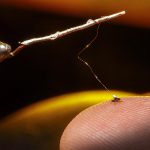 A wire is adhered to an aphid’s back with conductive paint.
A wire is adhered to an aphid’s back with conductive paint.With a $1.5 million CAREER award, Nebraska’s Joe Louis, Harold and Esther Edgerton Assistant Professor of Entomology, aims to help sorghum resist sugarcane aphids without pesticides.
To investigate sorghum’s natural defenses against aphids, Louis’ team turned to a special sorghum population created from varieties found globally to identify plants that are more resistant and those more susceptible to the pest.
By comparing their differences using a blend of molecular, biochemical and electrophysiological approaches, Louis is investigating the genetic basis for resistance. With this information, breeders and molecular biologists will be able to develop more resilient sorghum varieties.
The research may also help other crops defeat aphids and other sap-sucking insects.
NSF’s Plant Genome Research Program and Established Program to Stimulate Competitive Research co-fund this project.
Additional Content
Nebraska news release: Study of sorghum-munching aphids earns NSF award
 Toshihiro Obata
Toshihiro Obata
Uncovering How Metabolism Goes Awry
Missteps in metabolism are implicated in hundreds of human disorders – including the unwelcome middle-age spread.
Nebraska’s Toshihiro Obata, assistant professor of biochemistry, is researching a key component of metabolic regulation that will improve understanding of the many ways metabolism goes awry.
Metabolism fuels numerous vital functions through a series of chemical reactions coordinated by a network of enzymes, many of them organized into multi-enzyme complexes.
With a nearly $750,000 CAREER award, Obata’s team is manipulating multi-enzyme complexes involved in cellular respiration in yeast. They’re investigating relationships between metabolic activity and the complexes’ structures and interactions.
Obata’s research may uncover genetic mutations that lead to metabolic disorders related to enzyme complex formation.
Because multi-enzyme complexes are found in nearly all living organisms, better understanding metabolic regulation will have broad benefits, from improving crop resilience and yields to new methods of synthesizing useful compounds, such as medicines.
Additional Content
Nebraska news release: Identifying why metabolism mistakes occur is aim of Obata’s CAREER award
Developing Cold-Hardy Crops
 Rebecca Roston
Rebecca Roston
Despite its status as Nebraska’s most iconic crop, corn just can’t take the winters.
Temperatures below zero degrees Celsius trigger a cascade of lethal damage, limiting the crop’s seasonal and geographic range at a time when a growing global population requires more food.
To help develop crops better able to tolerate freezing conditions, Nebraska’s Rebecca Roston is studying Arabidopsis thaliana to identify what allows the plant to survive below-freezing temperatures.
Roston, assistant professor of biochemistry, is building on her previous research that identified a key protein in stymying cold-induced cellular damage.
Now, with a nearly $850,000 CAREER award, Roston is zeroing in on how the protein manipulates plant lipids to stabilize chloroplast membranes in freezing temperatures. She’s also investigating what sparks this protective response, likely a biochemical process called phosphorylation initiated by a reaction to cold.
Roston is a member of the university’s Center for Plant Science Innovation.
Additional Content
Nebraska news release: Award boosts Roston’s work to pave the way for freeze-tolerant crops
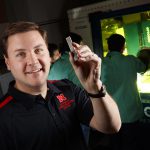 Michael Sealy
Michael Sealy
Building Better Biodegradable Implants
Not all medical implants need to stick around after their job is done. Implants that dissolve
over time are increasingly an option, particularly plates and pins used to repair bone.
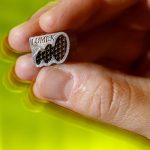 Examples of implants that can be made using the 3D printers in the College of Engineering’s Nebraska Engineering Additive Technology, or NEAT, Labs.
Examples of implants that can be made using the 3D printers in the College of Engineering’s Nebraska Engineering Additive Technology, or NEAT, Labs.Nebraska’s Michael Sealy, assistant professor of mechanical and materials engineering, is bringing high-tech 3D printing to manufacturing biodegradable implants, making them stronger, lighter and less prone to corrosion and fatigue than conventional biodegradable implants.
The method he’s developing with a $500,000 CAREER award is a mouthful — multi-process asynchronous hybrid additive manufacturing. It’s a type of 3D printing that allows Sealy to precisely print a metal object layer by layer.
For medical devices, he’s using magnesium, a lightweight metal that dissolves in the body. By altering printing formulas and layering patterns, Sealy can customize degradation rates and other behavior.
The approach also could be used to manufacture lighter, stronger components for airplanes, vehicles and the military.
Sealy uses specialized 3D printers available through the Nebraska Engineering Additive Technology Labs, a cutting-edge regional hub for additive manufacturing research.
Additional Content
Nebraska news release: Award bolsters Sealy’s study of 3D metal printing for medical devices, other applications
 Rebecca Wachs
Rebecca Wachs
Targeting Pain Where It Hurts
Instead of giving back pain sufferers an opioid, a major source of the nation’s drug-addiction crisis, Nebraska engineer Rebecca Wachs is tackling pain where it hurts.
With a $510,400 CAREER award, Wachs is engineering a solution targeted directly at treating nerve fibers that grow deep into deteriorating spinal discs, a source of chronic pain.
Wachs, assistant professor of biological systems engineering, is identifying and testing drugs and proteins that force nerve fibers to retreat from the disc. To block regrowth, she’s investigating other materials known to prevent nerves from regrowing after spinal injuries.
The goal is to package the cocktail of biomaterials into a single injection or other noninvasive treatment, eliminating the cause of pain rather than masking it with opioids.
This nerve-targeting approach is novel because most research focuses on the degenerating disc, Wachs said. But many people with disc degeneration don’t experience pain, suggesting other factors may be to blame.
Additional Content
Nebraska news release: Wachs’ CAREER award boosts development of first-of-its-kind treatment for low back pain
 Limei Zhang
Limei Zhang
Tracking Clue to TB’s Toughness
Tuberculosis infects about 10 million people each year and kills 1.6 million, making it the world’s deadliest infectious disease. Nebraska’s Limei Zhang has discovered a clue that may help explain what makes TB notoriously difficult to treat.
With a $600,000 CAREER award, Zhang, assistant professor of biochemistry, is studying a shapeshifting protein in Mycobacterium tuberculosis that may help the bacteria evade the human immune system. Her research could lead to more effective treatments.
Zhang is investigating the protein’s ability to sense small changes inside human cells that trigger
it to alter its structure, which modifies its function. As cells adjust their biochemistry in response
to an invasion, the protein seems to provide a protective response, causing the bacteria to enter either an active or dormant phase.
A bacterium important to soil health and antibiotic development contains similar proteins. Better understanding the TB protein may also improve the bioengineering of medications and other products.
Additional Content
Nebraska news release: Nebraska biochemist explores role of proteins in health
These scientists earned CAREER awards as faculty members elsewhere and are continuing their projects at Nebraska.
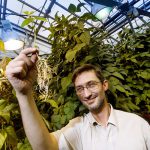 Marc Libault
Marc Libault
Boosting Nitrogen Fixation
Soybeans and other legumes can snatch nitrogen out of the air, an ability unique to few organisms.
They’re aided by rhizobia, common soil bacteria that convert atmospheric nitrogen into a form plants can use in a process called nitrogen fixation.
Marc Libault, associate professor of agronomy and horticulture, seeks to better understand the relationship between soybeans and rhizobia. His research could lead to improving soybeans’ nitrogen-fixing efficiency and to transferring the process to other crops.
Greater efficiency and expanding nitrogen fixation beyond legumes would allow crops to use atmospheric nitrogen and require less commercial fertilizer.
With a $575,000 CAREER award, Libault’s team is focusing on the initial stages of rhizobial infection. Researchers are identifying and investigating plant genes important to coordinating the activation and timing of gene expression in root cells in response to rhizobia.
Libault is affiliated with the university’s Center for Plant Science Innovation and Center for Root and Rhizobiome Innovation.
Additional Content
Nebraska news release: Nebraska plant biologist digs deeper into the alliance between soybeans, soil bacteria
 Bonita Sharif
Bonita Sharif
Tracking Eye Movement to Improve Coding
Nebraska’s Bonita Sharif is helping software programmers write code better and faster by looking into their eyes.
With a $432,000 CAREER award, Sharif is using the latest eye-tracking technology to map exactly where coders look as they search for bugs or software features within thousands of lines of code. She’s creating algorithms to analyze the eye movements.
With this information, Sharif is developing tools to show programmers where to look for similar code, automatically create links to recommended code and write English-language summaries to help orient others. These tools will also help beginning coders and students learn more quickly.
“By tracking what developers do while they’re doing it, we can improve the software development process itself,” said Sharif, assistant professor of computer science and engineering.
Sharif is also part of a multi-institutional team advancing eye-tracking software with funding through an NSF Community Research Infrastructure grant.
Additional Content
Nebraska news release: Sharif eyes how to help software developers write better code
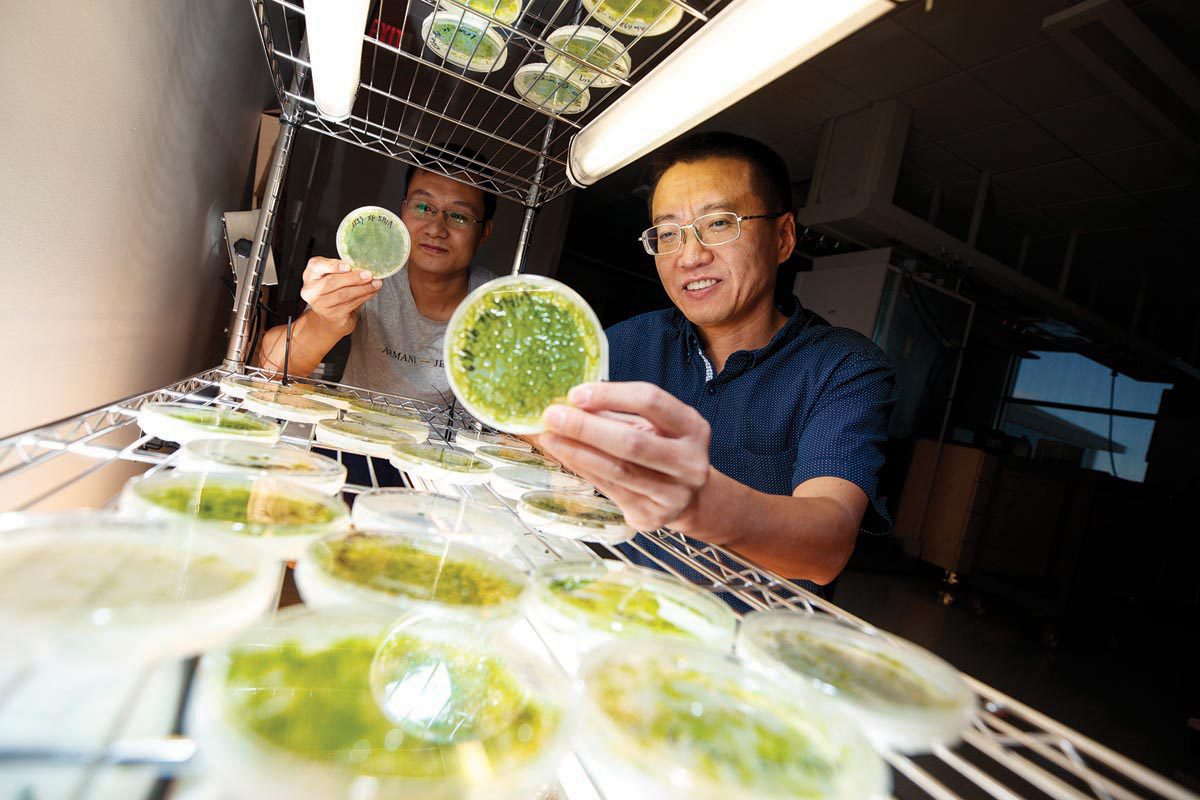 Yanbin Yin
Yanbin Yin
Computational Tools ID Key Enzymes
With entire genomes available for study, finding specific genes is challenging. Nebraska bioinformatics specialist Yanbin Yin is creating computational tools to quickly identify a class of enzymes found in all living organisms.
Yin’s tools will speed research across diverse disciplines, including biofuel production,
crop diseases and his own study of human gut health and plant evolution.
Yin, associate professor of food science and technology, is building on his earlier work that identifies carbohydrate-active enzymes, or CAZymes, within genetic code that researchers upload to a website. CAZymes produce, modify and break down all carbohydrates.
 Algae samples
Algae samples
With a $911,000 CAREER award, Yin is advancing his software to more thoroughly analyze CAZymes and predict how they function. The software’s algorithms learn as data is added. He will package the software on a free, user-friendly website.
Yin is a researcher in the Nebraska Food for Health Center.
Additional Content
Nebraska news release: CAREER award helps Yin develop tools to find key enzymes







